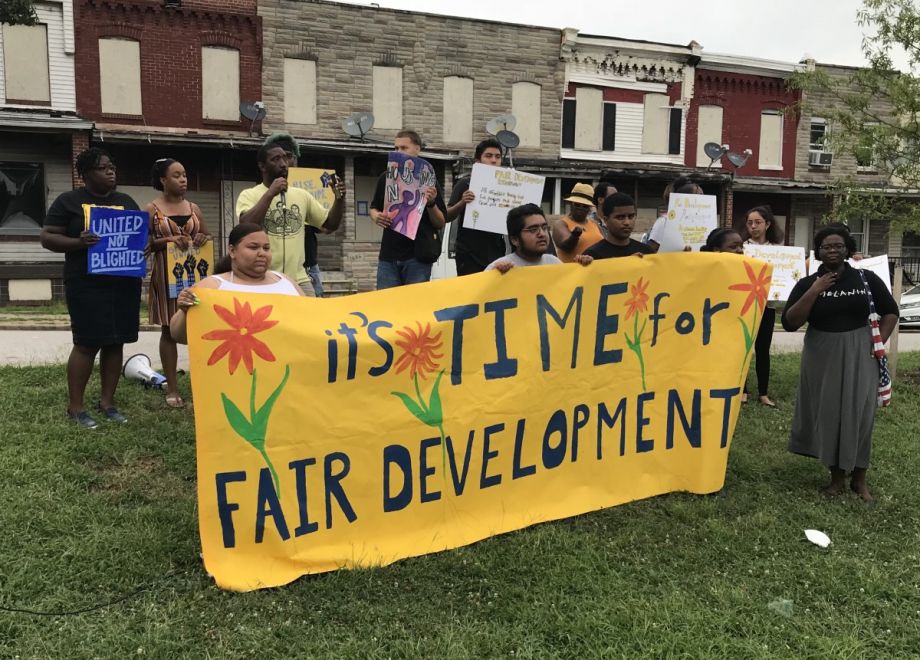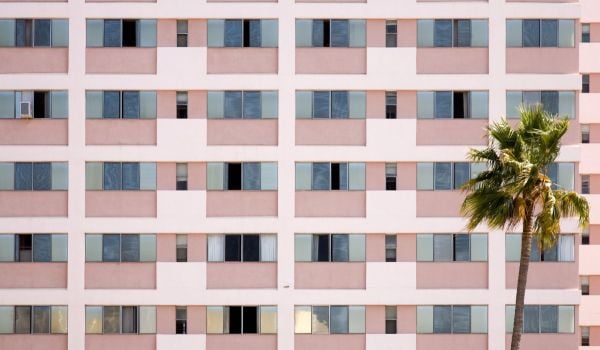A group of housing advocates and organizers in Baltimore has spent the last several years on a winning streak, and they see no reason to quit now.
In 2016, the group, a loose affiliation including members of United Workers and the Fair Development Roundtable (formerly Baltimore Housing Roundtable), gathered thousands of signatures to create a ballot referendum establishing an Affordable Housing Trust Fund. Then last year, when city officials seemed to be dragging their feet in dedicating funding, they pressured then-Mayor Catherine Pugh’s office into signing an agreement committing an eventual $20 million a year of city money for the fund, as Next City reported. Now, as the city’s Department of Housing and Community Development gets ready to make the funds available, they’ve created a detailed list of demands related it to how it should be spent.
At a meeting of the city-appointed Affordable Housing Trust Fund Commission last week, the Fair Development Roundtable presented a report outlining a shortlist of priorities for the fund — from permanent affordability to racial equity and accountability for developers who receive money — along with detailed scoring criteria for every category. The report was the work of a committee of the Fair Development Roundtable that studied best practices for funding affordable housing around the country starting last fall.
“We were like, look, we’re leading on this,” says Peter Sabonis, the director of legal strategies at the National Economic & Social Rights Initiative, who also works with United Workers and the Fair Development Roundtable. “Let’s continue to lead. We’re not going to get in the back seat now.”
From the outset, advocates have pushed the city to do more than it would have on its own, Sabonis says, and they have no reason to believe the dynamic will be different now that the fund is stocked and about to be operational.
“We knew the next step was going to be, alright, let’s come up with some criteria for distributing money,” Sabonis says. “So we wanted to get out front on that, because we’re the ones who created the trust fund. We don’t want to be caught in the same sort of political and bureaucratic zone, leaving these decisions … to those in government who, to date, have not taken much initiative in this area.”
In a presentation to the 12-member commission — five members of which are already affiliated with the advocates who created the fund and wrote the new report — the group emphasized that the fund needs to strive for racial equity, permanent affordability, and community control of land and development. But the report takes a more fine-grained approach, outlining eight “threshold criteria” with basic qualities that every project must have to receive funding. It also scores applications based on specific targets for local hiring, minority participation, deep affordability, environmental sustainability features, accessibility for people with disabilities, and other features. It would require that developers pay back any funding they receive if they don’t meet the benchmarks they agree to. It also includes measures for race equity in geographic locations, prioritizing projects that establish new affordable housing in “Communities of Opportunity” as defined by the state, or in “redlined or historically disinvested communities.”
“Development must prioritize people with greatest need and redress structural, social wrongs,” the report says. “Development must be controlled by the communities and residents affected by development.”
The report also encourages the prioritization of funding for community land trusts, which typically hold property in common ownership and share equity with tenants to keep home prices low. In South Baltimore, Meleny Thomas, a United Workers organizer, has been working to establish a community land trust for low-income residents. So far, the land trust owns one building, which is occupied by a low-income tenant who is also an organizer, and it is working on acquiring its second building. It’s important that the agencies distributing affordable-housing funds prioritize deep affordability and community control of development, Thomas says.
“These funds that we fought for — the funds that we worked hard to acquire — we need the community the Commission and DHCD to stand up and say, ‘OK … these funds cannot go toward displacing anyone,’” Thomas says.
The Affordable Housing Trust Fund Commission has been meeting monthly to develop recommendations on how the fund should work. In the fall, the Department of Housing and Community Development is expected to issue a “Notice of Funding Availability” for developers and community groups looking to take advantage of the new housing trust fund. The Commission has another meeting at the end of August. Asked how the city would use the report, a public information officer for DHCD wrote in an email, “The AHTF Commissioners are in the process of receiving information that will inform the recommendations they make to DHCD. We look forward to receiving those recommendations which will advance the historic agreement reached between the City and the Fair Development Roundtable.”
However, the Affordable Housing Trust Fund Commission was generally receptive to the report, says Iletha Joynes, a United Workers organizer and a renter who serves on the commission. Joynes says she put on the record at the meeting that she wants the scoring criteria in the Fair Development Roundtable report included in the Notice of Funding Availability that DHCD will release in the fall.
“They [the city] have said that they’re onboard,” Joynes says. “We just want to make sure that past practices don’t continue, which is, normally, things going on behind the scenes without real meaningful participation from the people.”
At the top of the Fair Development Report is the often-quoted line from Frederick Douglass, that “power concedes nothing without a demand.” It’s a century-and-a-half-old maxim, but in Baltimore, it seems to be plenty alive.
This article is part of Backyard, a newsletter exploring scalable solutions to make housing fairer, more affordable and more environmentally sustainable. Subscribe to our weekly Backyard newsletter.

Jared Brey is Next City's housing correspondent, based in Philadelphia. He is a former staff writer at Philadelphia magazine and PlanPhilly, and his work has appeared in Columbia Journalism Review, Landscape Architecture Magazine, U.S. News & World Report, Philadelphia Weekly, and other publications.
Follow Jared .(JavaScript must be enabled to view this email address)


















